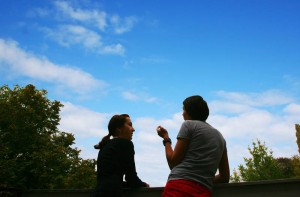
When I arrived at ECLA, the first thing I noticed was the view from my dorm of the clear sky.
I like to point my gaze upward wherever I go, taking the time to contemplate, for even just a little bit, the progression of human life and my life in particular. The sky is like a map of all the possible and potential paths, past, present and future: the white fluffy lines left by planes remind me of the various directions we take at one point or another, and the starry sky…well, the indigo star-filled night sky, navigates me through the very history of the Universe. In those moments I like to trace, to follow and guess what is going to happen next.
We all feel that need to think about life from time to time, and generally in that very instant, we tend to find ourselves very much alone. It is as if we are suddenly removed from the everyday bustle, which is like a fast stream we find ourselves looking at from the shore.
Surely, we can be aware and mindful of the fact that this is not an aberrant trait we somehow acquired and that this removal, pause, contemplation is bound to catch up with and envelop every human being at one point or another. The thing is, that very moment, in which our mind expands as if to assimilate, to engulf all of the possibilities, answers, directions, paths to the questions, ideas or problems it has engendered, is bound to be a solitary one; more often than not, it seems like you are standing alone on the ‘shore’—that slightly altered reality—and you are talking to yourself.
This inquiry into life, in its deepest, most contemplative state puts one at an almost imperceptible distance from the things observed, from others, and, in a sense, from the everyday self, oblivious and even hostile to its separation from that, which simply is, as if to offer a panoramic view to a complete stranger who is eager to explore the various routes, a native would consider merely means and not goals. It is a beautiful, but very private activity, if not a lonely one.
Perhaps, this is the reason why we sometimes tend to get lost in those moments of questioning and searching; of that removing from the everyday ‘stream of activity’ and upon entering the stream of consciousness. The opening of this vast intelligible space offers plenty of room for wandering, losing and finding oneself, but we feel vulnerable in it so we rarely share it, even when given the opportunity.
But before I get lost myself, I would like to take the time here to talk about the chance to accept and offer this space as a mutual ground, the inviting of the other to the meeting of the human-to-human in it; I would like to talk about the possibility for dialogue.
Although I have been at ECLA for only about ten days now, I can say that one of the most characteristic things about it is its ability to foster dialogue. Everyone I have met so far is a wanderer, a private explorer in his or her own right, who is never afraid, but quite eager to invite the complete other, the complete stranger to share in that intelligible space and create a common ground for searching and finding.
It is a close-knit community, but mere proximity has little to do with this opening: it is a community of people, who rather than dreading those moments of solitary contemplation, in fact welcome them not only as an opportunity to learn, to see, to feel anew, but also and maybe more, as an opportunity for a true dialogue.
A genuine conversation here entails genuine questioning, genuine wonder when it comes to being, genuine response, and response-ibility, if I may add, in addressing the other as a human being, as the human being, in whose nature lies the desire to offer and engage in dialogue. At ECLA, people overcome the vulnerability of sharing the otherwise private space because of their awareness of the beauty of the meeting of the other, and the potentiality to move and create together.
Both faculty and students talk to each other not from any fixed position, i.e. that of an instructor or a student, but from that of a human-addressing-human. Every person here takes the responsibility to listen to and respond to the other from that vantage point of the ‘shore’ and welcomes him/her to stand and gaze, follow, and trace, side by side.The way we read, discuss, listen to and talk to each other is in terms of a dialogue.
So nowadays, when I go out on the balcony to look up the sky, there is not a thing I enjoy and crave more than to share in a dialogue with a fellow gazer.
by Maria Androushko (1st year BA, Bulgaria)
